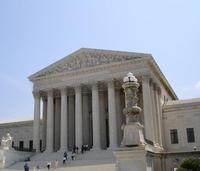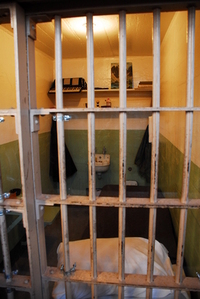 One of the most common questions I get asked when I get a phone call from somebody who has recently been arrested is “can my case be dismissed if the police did not read me my rights when I was arrested?” The answer to that question requires an understanding of the Fifth Amendment to the United States Constitution. Everyone has heard of the Fifth Amendment, especially because of television crime shows, but let’s take a closer look at why the Fifth Amendment is important, what it is and what it does.
One of the most common questions I get asked when I get a phone call from somebody who has recently been arrested is “can my case be dismissed if the police did not read me my rights when I was arrested?” The answer to that question requires an understanding of the Fifth Amendment to the United States Constitution. Everyone has heard of the Fifth Amendment, especially because of television crime shows, but let’s take a closer look at why the Fifth Amendment is important, what it is and what it does.
The Fifth Amendment creates a number of rights that apply to people facing criminal and civil legal proceedings. First, it guarantees a citizen the right to a grand jury. Second, it forbids “double jeopardy.” Third, it requires that “due process of law” be part of any Court proceeding that denies a citizen “life, liberty or property.” Fourth, it requires that the government compensate a citizen when it takes their private property for public use. Fifth, if protects citizens from “self-incrimination.” That last Fifth Amendment right, the right against self-incrimination, is the one that is commonly associated with the “Miranda Rights.” Self incrimination is basically when you make a statement that exposes yourself to legal or criminal responsibility. Think of it as making a statement that ends up being a confession. It’s when you are admitting to a crime, or making a confession. The Fifth Amendment protects citizens from being forced or coerced to testify against themselves. Self-incrimination is prohibited by the Fifth Amendment to the United States Constitution. So when you hear that someone has “taken the Fifth,” this means that they are refusing to testify in court or talk to the police. This right against self-incrimination is one of the basic principles of American Constitutional Law. It’s the absolute right to remain silent when you are being questioned by the police. But just like any other constitutional right, this right is not absolute. There are limitations.
The seminole case that deals with the Fifth Amendment is the U.S. Supreme Court case of Miranda v. Arizona. Arguably the most well-known, or most mentioned, criminal case. Let’s talk a little about this Supreme Court case so we can get a better understanding of what this case did and how it applies to today. Miranda v. Arizona was actually four different cases involving custodial interrogations that were consolidated into one case. The first case involved Miranda and that’s why it became known as the Miranda case. But it actually involved four different cases involving criminal prosecutions and custodial interrogations. In all cases, the defendants were arrested by the police, taken down to the police station, and interrogated for several hours. All of the defendants made confessions to the police that prosecutors tried to use against them in court. Prior to this case, the right against self-incrimination was thought of as applying only to proceedings in court. But in this case, the Supreme Court extended and applied the 5th Amendment to proceedings that happened before the case went to court. The court applied the right against self-incrimination in the 5th Amendment to all criminal proceedings that begin once a criminal defendant is deprived of their freedom of action. And here is where we find the main limitation in Miranda. The rights afforded in Miranda apply to custodial interrogations. You are in custody if you are deprived of your freedom of action in any significant way. It doesn’t matter if the interrogation occurs in the jail, at the police station, at the scene of a crime on a busy street, or in the middle of nowhere. If you are not free to leave, then you are considered to be in custody and that’s when the Miranda warnings have to be given. Once it is established that you were in custody and the police start questioning you, in order for the prosecutor to be able to use the statements that you make to them in court, the police have to read you your Miranda Rights. Those rights have to warn you that you have the right to remain silent. If you say anything what you say can be used against you in a court of law. You have the right to consult with a lawyer and have that lawyer present during any questioning. If you cannot afford a lawyer, one will be appointed for you if you so desire. If you choose to talk to the police you have the right to stop the interview at any time. Very rarely have I seen TV shows mention this last warning. And this is very important because if you are ever questioned, you have the right to demand that they provide a lawyer to you free of charge before answering any questions. Once you assert that right, the police must stop all questioning until and unless they provide a lawyer for you. You have the right to demand a lawyer at any time during the interrogation. From my experience, I don’t know if I have ever seen the police actually provide a lawyer at this point once it is requested by the defendants.
 Last week I had a meeting with a client in my office in Schaumburg who was being charged with a felony in Rolling Meadows. The client has a lawyer who was representing him for the case. The client came in for a consultation because he was not happy with the services that his current lawyer was providing and was considering hiring me to represent him in the case. The client told me that he had spoken to his lawyer and requested copies of the police reports. His lawyer refused to provide copies of the police report and the client was very upset with that decision.
Last week I had a meeting with a client in my office in Schaumburg who was being charged with a felony in Rolling Meadows. The client has a lawyer who was representing him for the case. The client came in for a consultation because he was not happy with the services that his current lawyer was providing and was considering hiring me to represent him in the case. The client told me that he had spoken to his lawyer and requested copies of the police reports. His lawyer refused to provide copies of the police report and the client was very upset with that decision. Chicago Criminal Lawyer Blog
Chicago Criminal Lawyer Blog


 It is common to have a client come into my office who is facing criminal charges resulting from a search of their vehicle by a police officer. Many of those clients want to know whether the police had the right to search their vehicle and whether I can have the evidence that was recovered thrown out of Court. There’s no simple answer to this question. Whether the police had the right to search the vehicle and whether I can convince the Court to throw out the evidence depends on the facts of each individual case. I want to talk a little bit about the general rules and what the constitutional limits are when it comes to the police searching a motor vehicle.
It is common to have a client come into my office who is facing criminal charges resulting from a search of their vehicle by a police officer. Many of those clients want to know whether the police had the right to search their vehicle and whether I can have the evidence that was recovered thrown out of Court. There’s no simple answer to this question. Whether the police had the right to search the vehicle and whether I can convince the Court to throw out the evidence depends on the facts of each individual case. I want to talk a little bit about the general rules and what the constitutional limits are when it comes to the police searching a motor vehicle. Recently, I won a Source of Funds hearing at the Maywood Courthouse. At my client’s initial bond hearing, the judge required that my client prove the source of funds prior to being allowed to post the required amount of the cash bond. Immediately after the bond hearing I was contacted by my client’s family and hired to do whatever I could to get my client out of jail. I immediately got to work and today, my client is a free man. Here’s how this case started and how I was able to get him released.
Recently, I won a Source of Funds hearing at the Maywood Courthouse. At my client’s initial bond hearing, the judge required that my client prove the source of funds prior to being allowed to post the required amount of the cash bond. Immediately after the bond hearing I was contacted by my client’s family and hired to do whatever I could to get my client out of jail. I immediately got to work and today, my client is a free man. Here’s how this case started and how I was able to get him released. This is a question that I am asked frequently around election time. Most people do not understand what the rules are when it comes to whether you are allowed to vote if you have a felony conviction. Rules vary from state to state and this has created confusion. People don’t understand that each state has it’s own rules which requires that people with felony convictions inform themselves of what the rules are in their state. My experience with this issue is that most people are not informed as to what the law is in Illinois when it comes to felony convictions and voting rights in Illinois. Illinois has passed a specific law which spells out what effect a felony conviction can have on your right to vote in Illinois. The law is set out in 10 ILCS 5/3-5. In Illinois, a convicted felon has just as much of a right to vote as any other citizen in the state. As long as you are not incarcerated, meaning serving a prison sentence, you can register and cast a vote in Illinois. If you are in court and fighting your case, you can vote in Illinois. Even if you are in jail fighting your case. If you are on probation, you can vote in Illinois. If you are on parole, you can vote in Illinois. As long as you have not been convicted and are in prison, you can vote. However, if instead of being in prison, you are allowed to serve your sentence outside of prison, such as prison furlough or work release, you will not be allowed to vote until you finish your sentence. If you went to prison and lost the right to vote you should re-register once you are released from prison so that you can go to the polls and cast your vote.
This is a question that I am asked frequently around election time. Most people do not understand what the rules are when it comes to whether you are allowed to vote if you have a felony conviction. Rules vary from state to state and this has created confusion. People don’t understand that each state has it’s own rules which requires that people with felony convictions inform themselves of what the rules are in their state. My experience with this issue is that most people are not informed as to what the law is in Illinois when it comes to felony convictions and voting rights in Illinois. Illinois has passed a specific law which spells out what effect a felony conviction can have on your right to vote in Illinois. The law is set out in 10 ILCS 5/3-5. In Illinois, a convicted felon has just as much of a right to vote as any other citizen in the state. As long as you are not incarcerated, meaning serving a prison sentence, you can register and cast a vote in Illinois. If you are in court and fighting your case, you can vote in Illinois. Even if you are in jail fighting your case. If you are on probation, you can vote in Illinois. If you are on parole, you can vote in Illinois. As long as you have not been convicted and are in prison, you can vote. However, if instead of being in prison, you are allowed to serve your sentence outside of prison, such as prison furlough or work release, you will not be allowed to vote until you finish your sentence. If you went to prison and lost the right to vote you should re-register once you are released from prison so that you can go to the polls and cast your vote. The recent wars in Iraq and Afghanistan have seen a dramatic rise in the number of mental health and substance abuse issues involving military veterans returning from serving in those wars. Some of these soldiers are returning home with mental health issues and are using drugs to deal with the mental health issues which such wars have caused. Those issues have spilled into the criminal justice system when these military veterans are getting arrested for crimes caused by substance abuse and mental health issues arising out of their military service. In an effort to address the specific needs of returning veterans, the Illinois Legislature passed legislation in 2009 establishing Veterans Courts in Illinois. The 2009 legislation did not require that counties establish such courts. Nevertheless, Cook County and Lake County did establish such courts. Veterans Courts are specific courts which are designed to steer military veterans out of the criminal punishment aspect of the court system and towards the treatment aspect of the court system. Specific courts have been established at 26th and California, Skokie, Rolling Meadows, Maywood, Bridgeview and Markham. The Veterans Courts in Cook County have been very successful and have been used as a model by court systems throughout the United States to help them establish their own Veterans Courts. The Illinois Legislature recently passed legislation requiring that each county in Illinois establish such a court by January 1, 2018. In anticipation of this new law taking effect, counties throughout Illinois are beginning to make plans to establish these courts. Kane County officials are aware of the new law and are beginning to make plans to start the process of establishing these courts.
The recent wars in Iraq and Afghanistan have seen a dramatic rise in the number of mental health and substance abuse issues involving military veterans returning from serving in those wars. Some of these soldiers are returning home with mental health issues and are using drugs to deal with the mental health issues which such wars have caused. Those issues have spilled into the criminal justice system when these military veterans are getting arrested for crimes caused by substance abuse and mental health issues arising out of their military service. In an effort to address the specific needs of returning veterans, the Illinois Legislature passed legislation in 2009 establishing Veterans Courts in Illinois. The 2009 legislation did not require that counties establish such courts. Nevertheless, Cook County and Lake County did establish such courts. Veterans Courts are specific courts which are designed to steer military veterans out of the criminal punishment aspect of the court system and towards the treatment aspect of the court system. Specific courts have been established at 26th and California, Skokie, Rolling Meadows, Maywood, Bridgeview and Markham. The Veterans Courts in Cook County have been very successful and have been used as a model by court systems throughout the United States to help them establish their own Veterans Courts. The Illinois Legislature recently passed legislation requiring that each county in Illinois establish such a court by January 1, 2018. In anticipation of this new law taking effect, counties throughout Illinois are beginning to make plans to establish these courts. Kane County officials are aware of the new law and are beginning to make plans to start the process of establishing these courts. One of the most common questions I get asked when I get a phone call from somebody who has recently been arrested is “can my case be dismissed if the police did not read me my rights when I was arrested?” The answer to that question requires an understanding of the Fifth Amendment to the United States Constitution. Everyone has heard of the Fifth Amendment, especially because of television crime shows, but let’s take a closer look at why the Fifth Amendment is important, what it is and what it does.
One of the most common questions I get asked when I get a phone call from somebody who has recently been arrested is “can my case be dismissed if the police did not read me my rights when I was arrested?” The answer to that question requires an understanding of the Fifth Amendment to the United States Constitution. Everyone has heard of the Fifth Amendment, especially because of television crime shows, but let’s take a closer look at why the Fifth Amendment is important, what it is and what it does. The Lake County State’s Attorney’s office has announced a new program that allows first time misdemeanor and felony offenders an opportunity to avoid having a criminal conviction permanently on their record. The Lake County State’s Attorney’s Office calls it the Alternative Prosecution Program. If the crime involves violence the offender is not eligible for the program. The Lake County State’s Attorney’s office makes the final decision on whether an offender will be allowed into the program. Here’s how it works.
The Lake County State’s Attorney’s office has announced a new program that allows first time misdemeanor and felony offenders an opportunity to avoid having a criminal conviction permanently on their record. The Lake County State’s Attorney’s Office calls it the Alternative Prosecution Program. If the crime involves violence the offender is not eligible for the program. The Lake County State’s Attorney’s office makes the final decision on whether an offender will be allowed into the program. Here’s how it works. What determines how serious a particular criminal charge in Illinois is depends on the potential criminal penalty that the crime carries. The lowest classification of crimes in Illinois is called a Misdemeanor. The highest classification of crimes in Illinois is called a Felony. Generally, any jail sentence for a Misdemeanor must be served in County Jail. Any jail sentence for a Felony must be served in State Prison. Any potential jail sentence for a Misdemeanor is under one year while any potential jail sentence for a Felony is one year or more. The range of penalties for Misdemeanors and Felonies in Illinois depend on what Class the crime you are charged with falls in. Every criminal offense is classified as a Felony or a Misdemeanor and assigned a specific Class. An experienced and knowledgeable criminal defense lawyer will know whether you are being charged with a Felony or a Misdemeanor and what class your criminal charge falls in.
What determines how serious a particular criminal charge in Illinois is depends on the potential criminal penalty that the crime carries. The lowest classification of crimes in Illinois is called a Misdemeanor. The highest classification of crimes in Illinois is called a Felony. Generally, any jail sentence for a Misdemeanor must be served in County Jail. Any jail sentence for a Felony must be served in State Prison. Any potential jail sentence for a Misdemeanor is under one year while any potential jail sentence for a Felony is one year or more. The range of penalties for Misdemeanors and Felonies in Illinois depend on what Class the crime you are charged with falls in. Every criminal offense is classified as a Felony or a Misdemeanor and assigned a specific Class. An experienced and knowledgeable criminal defense lawyer will know whether you are being charged with a Felony or a Misdemeanor and what class your criminal charge falls in. Cook County Chief Judge Timothy Evans has issued an order which makes the greatest attempt yet to deal with overcrowding in Cook County Jail which is caused by defendants being forced to sit in jail while their cases work their way through the Cook County criminal justice system simply because they cannot afford to post the bond needed to walk out of jail. Estimates place the number of defendants who are sitting in Cook County Jail just because they can’t afford to post bond at between 250 to 300 inmates per day. Most of those bonds are for $1,000 or less. This problem plays a major role in the overcrowding of the 9,000 inmate Cook County Jail. The overcrowding problem at Cook County Jail is causing a major strain on Cook County’s limited budget resources.
Cook County Chief Judge Timothy Evans has issued an order which makes the greatest attempt yet to deal with overcrowding in Cook County Jail which is caused by defendants being forced to sit in jail while their cases work their way through the Cook County criminal justice system simply because they cannot afford to post the bond needed to walk out of jail. Estimates place the number of defendants who are sitting in Cook County Jail just because they can’t afford to post bond at between 250 to 300 inmates per day. Most of those bonds are for $1,000 or less. This problem plays a major role in the overcrowding of the 9,000 inmate Cook County Jail. The overcrowding problem at Cook County Jail is causing a major strain on Cook County’s limited budget resources. A Pre-trial conference is the usual way that a criminal case is resolved in Illinois without the need to go to trial. The Pre-trial conference is a meeting that occurs between the prosecutor, the defense lawyer, and the judge. The meeting is usually, but not always, behind closed doors, and the parties all get together to discuss the case to see if there’s a way to work out an agreement short of trial. Illinois Supreme Court Rule 402 allows for this conference to happen and sets forth the requirements for such a conference to occur. That’s why this type of conference is commonly called a “402 Conference” by lawyers and judges.
A Pre-trial conference is the usual way that a criminal case is resolved in Illinois without the need to go to trial. The Pre-trial conference is a meeting that occurs between the prosecutor, the defense lawyer, and the judge. The meeting is usually, but not always, behind closed doors, and the parties all get together to discuss the case to see if there’s a way to work out an agreement short of trial. Illinois Supreme Court Rule 402 allows for this conference to happen and sets forth the requirements for such a conference to occur. That’s why this type of conference is commonly called a “402 Conference” by lawyers and judges.